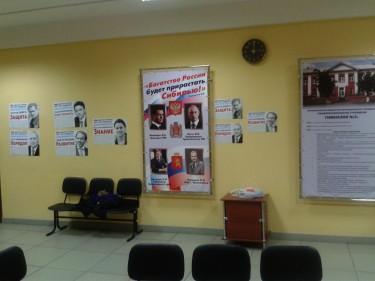This post is part of our special coverage Russia Elections 2011 [1].
A scandal caused by a hidden camera recording at a school in Krasnoyarsk, Siberia has highlighted a serious problem in Russian schools: teachers campaigning for the ruling party, United Russia [2].
Underpaid and dependent on government funding, teachers are one of the pillars of the current political system. Local and regional elections often take place in school buildings, and the electoral committees in Russia often consist mainly of teachers. Whether it's from fear of losing funding, or belief in United Russia's promises, this often leads to illegal electioneering in schools.
One brave student takes on the authorities
On 15 November, 2011, 15-year-old Matvey Tsivinyuk, uploaded a video of himself being scolded by his school principal, Alexandra Pronina, at Krasnoyarsk Gymnazium number 3 [3] (the website went offline after massive interest from bloggers).
Tsivinyuk had been caught defacing political posters that were hanging in the school hallways. The posters with a Russian tricolor flag in the background bore portraits of Prime Minister Vladimir Putin, President Dmitry Medvedev and two local politicians (see photo right).
Before meeting the principal, Tsivinyuk turned on the video recorder in his smartphone. The dialogue captured by the device has been widely cited as evidence of unlawful actions from school authorities, and also lends a narrative to explain the support for the current political regime.
Later that day, Tsivinyuk removed the video from his own profile but bloggers have not let the video [5] disappear:
http://www.youtube.com/watch?v=O9mqnH3JTzo [5]
Here is a translation of what is said:
Principal: Do you know what this means for you?
Tsivinyuk: It means nothing to me because, according to the point 5 of the article 9 of the Law on Political parties… [Matvey correctly cites the law [6] that forbids interference of the political process in education]
Principal: Enough, enough, Matvey. There's no article number 9, number 10, they [the police] will write that you damaged the poster. […] Does your family have lots of money to pay for the fine for the damage?
Tsivinyuk: A fine for the piece of paper?
Principal [screaming]: For the hooliganism! You understand it's not just a paper, it's a political poster!
Tsivinyuk: It can't be in school. Because the activity of political parties on the territory of schools is forbidden.
Principal: You understand, it's not campaigning.
Tsivinyuk: So what is it then?
Principal: It is not campaigning. People put it there so that everyone could read the biographies [of Medvedev, Putin, and local politicians]. From now on I forbid you to do anything to these posters. You've spoiled several posters. If you will spoil more, I will call the police.
Tsivinyuk: And what will they do to me?
Principal: I don't know. […] But I have warned you. […]
Then the principal compared Tsivinyuk to Lenin, and reminded him of Lenin's expulsion from his school and the university. After a digression about Tsivinyuk's religious beliefs (he's an Orthodox Christian) the Principal exclaimed:
Principal: How can a Christian person perform such non-Christian actions? [speaking of defacing a political poster]
Tsivinyuk: Political views and religious views are different spheres of life.
Principal [screaming]: If you don't understand this, let's meet with your leader [of the Orthodox Christian group Tsivinyuk belongs to]
Tsivinuyk: He has nothing to do with this.
Principal [screaming]: How is that? For example, I think that no one is teaching you this in school. No one teaches you in school how to do such nasty things, to write bad things on posters. Where and who teaches you then? Where did you get this into your head? We should find the place where you were taught this. […] Once again, the minimum is a fine.
Tsivinyuk: For what?
Principal: You still don't understand?
Tsivinyuk: Well, tell me the article number of the administrative code I have violated.
The principal did not explain to Tsivinyuk why the defacement of illegally hung political posters would be cause for administrative or police charges.
The case may have never reached the public had it not been for Moscow blogger and journalist Vladimir Varfolomeev who published [7] [ru] the story in his blog (the post attracted more than 2,000 comments). Siberian and federal websites quickly re-published the story.
Vice-Governor of Krasnoyarsk, Sergey Ponomarenko, said [8] [ru] that Tsivinyuk's actions were “mean” and this attracted critical comments from bloggers who said United Russia and Ponomarenko himself were the “mean” ones.
By the end of the day, Tsivinyuk removed his video (there is no information regarding what pressure was put on him). On his Vkontakte page (Russian equivalent to Facebook) he wrote [ru]:
Я не сдался, но я больше не занимаюсь политикой. Надеюсь, вы меня правильно поймёте, не лезьте в дерьмо, думайте о будущем, берегите друзей.
There have been many incidents of this nature leading up to the Russian election in March 2012. Kartanarusheniy.ru [9] [ru], a website that crowd-sources reports of electoral fraud, currently lists 737 cases of “Authorities creating preferential conditions [for candidates]”. And last year, a video [10] [ru] on YouTube showed teachers in one school giving first-graders gifts while talking about how great United Russia is.
The dialogue between the hysterical principal versus the calm, tech-savvy Tsivinyuk who knows the law, represents a huge generational gap, and a hope that the obscurity and ignorance (for instance assuming that all knowledge comes from school) can be exposed and defeated.
This post is part of our special coverage Russia Elections 2011 [1].
